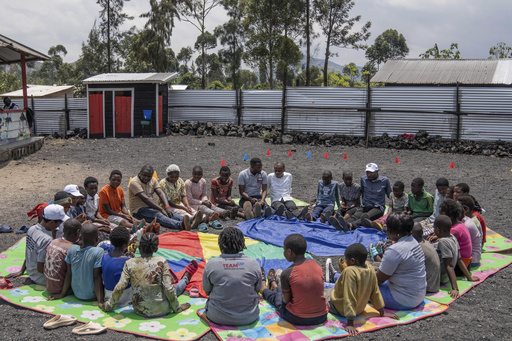
GOMA, Congo — Nelly Shukuru felt trapped in an unbearable situation. The violence that forcefully uprooted her from her home, combined with the harsh realities of life in a displacement camp in eastern Congo, left her contemplating suicide. “In my mind, the suffering was permanent,” the 51-year-old mother of six shared at a health facility. “The people who have died are better off than I am.”
Years of conflict in eastern Congo have resulted in a severe mental health crisis. Aid organizations report a significant increase in individuals seeking mental health care as clashes become more frequent. Many of those impacted are living in overcrowded and unsafe displacement camps that offer little chance for recovery.
According to the humanitarian group Action Against Hunger, the number of individuals receiving psychosocial support in camps surrounding Goma surged over 200% from January to June this year compared to the same timeframe last year—rising from 6,600 to over 20,000. The number of people experiencing suicidal thoughts also soared, climbing from about five per month in January to over 120.
The struggle for control among more than 100 armed groups in mineral-rich eastern Congo, particularly near the Rwandan border, has contributed to this turmoil. The reemergence of the M23 rebel group, allegedly receiving support from Rwanda, has exacerbated the violence. The ongoing conflict has displaced millions, with over 600,000 people now seeking refuge in camps near Goma.
Psychologists note that rising levels of anxiety, depression, post-traumatic stress disorder, insomnia, and substance abuse are becoming increasingly common among those affected. “All around us there is war, and the number of people facing difficulty is increasing daily,” stated Innocent Ntamuheza, a psychologist with Action Against Hunger.
Sadly, mental health resources remain scarce. The United Nations reported that less than 30% of the requested $180 million for protection, which includes mental health services, has been funded this year. They regard Congo as one of the world’s most neglected humanitarian crises.
Shukuru recounted a particularly troubling moment from August when she contemplated suicide after a violent altercation with her 21-year-old son, who struck her with a rock in a dispute over a radio. The idleness of her children in the camp worsened their drinking habits. Previously, her family farmed and attended church in nearby Sake, but they fled in February when their community was bombed.
Shukuru’s husband, a construction worker, struggles to find consistent employment, and the aid they receive falls short of meeting their needs.
Many of the camps where displaced families live are perilously close to active conflict zones. In May, Shukuru’s camp was bombarded, resulting in the deaths of approximately 40 people and injuring many more. Reports indicate that armed individuals mingle among the camp’s residents; in an August visit, armed men and a truck bearing military uniforms were seen passing through, chanting war songs.
The government has collaborated with militia groups, under the coalition Wazalendo, to push back against the M23. However, these groups—once considered allies—are now accused of human rights violations, including sexual assault, according to local residents and aid organizations.
A 38-year-old woman shared her trauma after being raped in May by three armed men while foraging for food. Although she seeks assistance at a Doctors Without Borders clinic, her nights are haunted by nightmares of the assault. The persistent presence of armed men in the camp exacerbates her emotional distress, as she elaborated, “It reminds me of the men who raped me.”
Professionals specializing in mental health have noted that survivors frequently revisit traumatic experiences, especially concerning sexual violence. In a shocking report from September, Doctors Without Borders stated that they had treated over 25,000 survivors of sexual violence last year, with the trend continuing this year, predominantly within displacement camps in Goma.
While Lt. Col. Guillaume Ndjike, a spokesman for the eastern Congolese army, claimed that efforts are being made to protect those in camps through night patrols and police stations, locals and aid workers argue that accountability is lacking for perpetrators of violence.
In response to this urgent crisis, some organizations are working to train community leaders to identify individuals who might require mental health support and direct them to clinics. They look out for those who appear isolated, stressed, or have recently lost their jobs, recognizing that stigma can often hinder individuals from seeking help.
For those who have accessed mental health treatment, learning coping mechanisms such as breathing techniques has proven beneficial. Josephine Mulonda, 52, found some relief through a method called the “butterfly hug,” which helped her ease anxiety stemming from her husband’s violent death in January.
War Child, an organization dedicated to aiding youth in conflict zones, encourages children to express their feelings through movement, music, and play. In one camp, children danced in a circle chanting, “Let me cry, I’m crying,” while the organization also provides parents with strategies to support their children emotionally.
Nevertheless, numerous children remain deeply affected, often having lost their families through violence or separation. For instance, a 14-year-old girl, separated from her family during an attack, now lives with another family but lives in fear of violence during her long treks into the bush to gather firewood to sell. She has contemplated ending her life to escape her suffering and finds temporary solace in the psychological support provided by War Child, despite her ongoing uncertainty regarding her mother’s fate.
